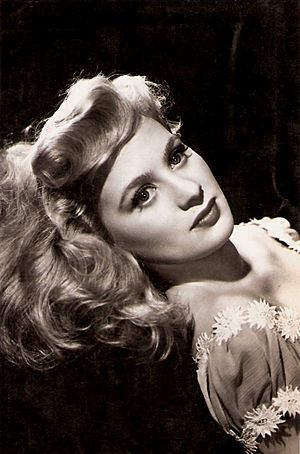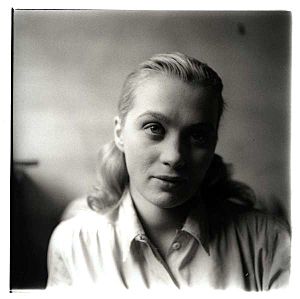Mai Zetterling facts for kids
Quick facts for kids
Mai Zetterling
|
|
|---|---|

Zetterling from a promotional postcard for Quartet (1948)
|
|
| Born |
Mai Elisabeth Zetterling
24 May 1925 Västerås, Sweden
|
| Died | 17 March 1994 (aged 68) London, England
|
| Occupation | Actress, film director |
| Years active | 1941–1994 |
| Spouse(s) |
Tutte Lemkow
(m. 1944; div. 1953)David Hughes
(m. 1958; div. 1979) |
| Children | 2 |
Mai Elisabeth Zetterling (born May 24, 1925 – died March 17, 1994) was a talented Swedish film director, writer, and actress. She worked in movies and television for over 50 years, from the 1940s to the 1990s.
Contents
Early life and acting start
Mai Zetterling was born in Västerås, Sweden. She came from a working-class family. When she was just 17 years old, she started her acting career at Dramaten, which is Sweden's national theatre. She appeared in films made during the war.
Becoming a film star
Mai Zetterling became well-known in 1944. This was after her role in the film Torment. The famous director Ingmar Bergman wrote this movie for her. In the film, she played a troubled shopgirl.
Soon after, she moved to England. She quickly became successful there with her main role in the film Frieda (1947). In this movie, she acted alongside David Farrar.
After a short time back in Sweden, where she worked with Ingmar Bergman again on his film Music in Darkness (1948), she returned to Britain. She starred in many British films. She acted with famous leading men like Tyrone Power, Dirk Bogarde, and Peter Sellers.
Some of her most famous films as an actress include:
- Quartet (1948), which was based on short stories by William Somerset Maugham.
- The Romantic Age (1949), directed by Edmond T. Gréville.
- Only Two Can Play (1962), where she co-starred with Peter Sellers.
- The Witches (1990), a movie based on Roald Dahl's popular book.
Mai Zetterling as a director
In the early 1960s, Mai Zetterling started directing films and writing books. Her first films were political documentaries. She also made a short film called The War Game (1963). This film was nominated for a BAFTA award. It also won a Silver Lion award at the Venice Film Festival for Best Short Film.
One critic called her first feature film as a director "one of the most ambitious debuts since Citizen Kane." When some critics said she directed "like a man," she decided to explore themes about women's rights even more in her movies.
Her film The Girls (1968) had a cast of well-known Swedish actresses, including Bibi Andersson and Harriet Andersson. This movie talked about women's freedom in a world mostly controlled by men. The characters in the film compared their lives to those in an old play called Lysistrata. They realized that things had not changed much for women since ancient times.
In 1966, Mai Zetterling also appeared on a BBC children's TV show called Jackanory. She narrated five episodes of Finn Family Moomintroll by Tove Jansson.
Personal life
Mai Zetterling was married to the Norwegian actor Tutte Lemkow from 1944 to 1953. They had two children, a daughter named Etienne and a son named Louis. Louis is now a professor of environmental sociology.
From 1958 to 1976, she was married to the British author David Hughes. David Hughes worked with her on her first films as a director. The couple were friends with the composer Michael Hurd. He wrote the music for some of her films, like Flickorna and Scrubbers.
Death
Mai Zetterling passed away from cancer on March 17, 1994, in her home in London. She was 68 years old. This was one year after her last role on television.
Selected filmography
As director (complete)
- Lords of Little Egypt (1961 documentary short)
- The War Game (1963 short)
- Loving Couples (Älskande par) (1964)
- Night Games (Nattlek) (1966)
- Doctor Glas (1968)
- The Girls (Flickorna) (1968, "The Girls") - a feminist rumination on Aristophanes' classical anti-war play Lysistrata, with Bibi Andersson, Harriet Andersson and Gunnel Lindblom
- Vincent the Dutchman (1972 documentary short)
- Visions of Eight (1973 documentary) - segment "The Strongest".
- We Have Many Names (1976 short)
- The Moon is a Green Cheese (1977)
- Scrubbers (1983)
- Love (1982) - segments "Love From the Market Place", "The Black Cat in the Black Mouse Socks", and "Julia".
- The Hitchhiker (1985 TV series) - 3 episodes
- Amorosa (1986)
- Betongmormor (1986 documentary short)
- Crossbow (1989 TV series) - 3 episodes
- Chillers (1990 TV series) - 2 episodes
- Sunday Pursuit (1990 short)
As actor (selected)
- Lasse-Maja (1941)
- I Killed (1943)
- Prince Gustaf (1944)
- Torment (1944)
- Sunshine Follows Rain (1946)
- Iris and the Lieutenant (1946)
- Frieda (1947)
- Life Starts Now (1948)
- Music in Darkness (1948)
- Portrait from Life (1948)
- Quartet (1948)
- The Romantic Age (1949)
- The Bad Lord Byron (1949)
- The Lost People (1949)
- Blackmailed (1951)
- Hell Is Sold Out (1951)
- The Ringer (1952)
- The Tall Headlines (1952)
- Desperate Moment (1953)
- Knock on Wood (1954)
- Dance, Little Lady (1954)
- A Prize of Gold (1955)
- A Doll's House (1956)
- Abandon Ship (1957)
- The Truth About Women (1957)
- The Master Builder (1958)
- Playing on the Rainbow (1958)
- Jet Storm (1959)
- Faces in the Dark (1960)
- Piccadilly Third Stop (1960)
- Offbeat (1961)
- Only Two Can Play (1962)
- The Main Attraction (1962)
- Operation Mermaid (1963)
- The Man Who Finally Died (1963)
- The Vine Bridge (1965)
- Hidden Agenda (1990)
- The Witches (1990)
- Grandpa's Journey (1993)
See also
 In Spanish: Mai Zetterling para niños
In Spanish: Mai Zetterling para niños
 | Percy Lavon Julian |
 | Katherine Johnson |
 | George Washington Carver |
 | Annie Easley |


